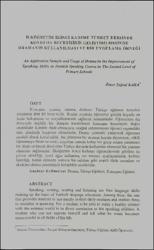| dc.contributor.author | Kara, Ömer Tuğrul | |
| dc.date | 2015-04-10 | |
| dc.date.accessioned | 2015-04-10T12:34:10Z | |
| dc.date.available | 2015-04-10T12:34:10Z | |
| dc.date.issued | 2009 | |
| dc.identifier.issn | 1302-1265 | |
| dc.identifier.uri | http://hdl.handle.net/11630/3771 | |
| dc.description.abstract | Konuşma, yazma, okuma, dinleme Türkçe eğitimin temelini oluşturan dört dil becerisidir.
Bunlar arasında öğrenciyi günlük hayatla en fazla buluşturan ve sosyalleşmesini sağlayan konuşmadır.
Öğrencinin dış dünyayla sağlıklı bir iletişim kurabilmesi konuşma becerisiyle doğru orantılıdır.
Kendini ifade edemeyen, isteğini anlatamayan öğrenci yaşamdaki tüm alanlarda başarısız olmaktadır.
Drama yöntemi yaşayarak öğrenme modeli olarak kabul edilir. Bu yöntemin bir ucunun hayata
dayanması, etkili öğrenmeye fırsat vermesi, soyuttan somuta kolay bir geçiş ortamı yaratması bir ifade
ve beceri dersi olan Türkçe dersinde kullanılan alternatif bir yöntem olmasını sağlamıştır. İlköğretim
ikinci kademe öğrencilerinde görülen öz güven eksikliği, yerel ağzı kullanma, ses tonunu
ayarlayamama, kelime fakirliği, beden dilinden yoksun bir anlatım gibi çeşitli ifade sorunları ve
eksikleri drama yöntemiyle kolaylıkla çözülebilir. | en_US |
| dc.description.abstract | Speaking, writing, reading and listening are four language skills making up the basic of
Turkish language education. Among these, the one that provides students to use mostly in their daily
routines and enables them to socialize is speaking. For a student, to be able to make a healthy contact
with the external world is in direct correlation to his speaking abilities. A student who can not express
himself and tell what he wants becomes unsuccessful in all fields of his life.
Process of drama is regarded as a model of learning by living. This process, owing to its
concerning with life, giving opportunities to effective learning and creating a simple transfer
possibility from concrete to abstract, helps to be an alternative method in Turkish lesson, an
expression and skills course. Some various expression problems such as loss of self-trust, use of native
accent, unadjusted voice tonnage, lack of vocabulary, a telling without gestures and mimics can be
easily solved by drama process. | en_US |
| dc.language.iso | tur | en_US |
| dc.publisher | Afyon Kocatepe Üniversitesi | en_US |
| dc.rights | info:eu-repo/semantics/openAccess | en_US |
| dc.subject | Drama | en_US |
| dc.subject | Türkçe Eğitimi | en_US |
| dc.subject | Konuşma Eğitimi | en_US |
| dc.subject | Konuşma Eğitimi | en_US |
| dc.title | İlköğretim İkinci Kademe Türkçe Dersinde Konuşma Becerisinin Geliştirilmesinde Dramanın Kullanılması ve Bir Uygulama Örneği | en_US |
| dc.title.alternative | An Application Sample and Usage of Drama in the Improvement of Speaking Ability in Turkish Speaking Course in The Second Level of Primary Schools | en_US |
| dc.type | article | en_US |
| dc.relation.journal | Sosyal Bilimler Dergisi | en_US |
| dc.department | Selçuk Üniversitesi, Sosyal Bilimler Enstitüsü, Türkçe Eğitimi ABD | en_US |
| dc.identifier.volume | 11 | en_US |
| dc.identifier.startpage | 151 | en_US |
| dc.identifier.endpage | 163 | en_US |
| dc.identifier.issue | 2 | en_US |
| dc.relation.publicationcategory | Makale - Uluslararası Hakemli Dergi - Kurum Yayını | en_US |



















